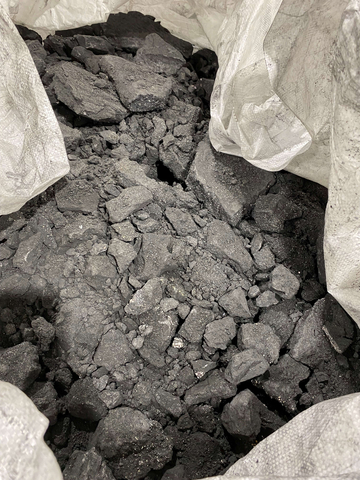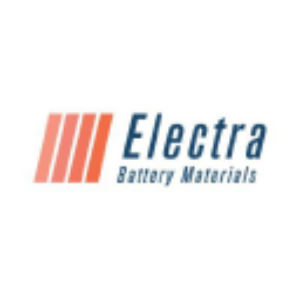Electra Achieves First Plant-Scale Recycling of Black Mass in North America
- Marks important milestone for North America’s EV battery supply chain -

Black mass material being processed at Electra’s refinery complex north of
“Initial results from our black mass trial are extremely encouraging,” said
Black mass is the industry term used to describe the material remaining once expired lithium-ion batteries are shredded and all casings removed. Black mass contains high-value elements, including nickel, cobalt, manganese, copper, lithium, and graphite, that once recovered, can be recycled to produce new lithium-ion batteries.
Established North American battery recyclers have focused on collecting and shredding of batteries with the resulting black mass material primarily treated by a pyrometallurgical smelting process that has a higher carbon footprint and lower metal recoveries than hydrometallurgical processes. Electra’s recoveries are believed to be the first successful production in a plant-scale setting using a hydrometallurgical process.
Recycling black mass will increasingly become a key feature of the EV battery supply chain given the strong demand for critical minerals and the looming supply deficit of metals such as nickel and cobalt. According to data from
Electra launched its black mass demonstration plant at the end of
As a result of preliminary results achieved thus far and interest expressed by potential commercial partners, Electra has decided to extend its black mass processing and recovering activities through
The total amount of material to be processed and recovered through June will be determined in the coming weeks. The Company has identified multiple sources of supply, and is in discussions on terms and conditions with vendors.
All of Electra’s recovered material will be sold to third-party companies for additional processing and re-use in a number of applications.
Refinery Project Update
Since its last update released in November, 2022, Electra has made continued progress on the commissioning and construction of its cobalt refinery project despite ongoing supply chain disruptions and delivery delays to critical pieces of equipment.
Through
- Completed all testing of existing brownfield equipment.
- Completed 90 to 95 percent of all procurement.
- Completed 90 to 95 percent of detailed engineering.
- Completed approximately 90 percent of the erection of the solvent extraction plant.
- Completed construction of the cobalt sulfate loadout facility.
- Increased the project owners’ team to 31 personnel, which include tradespeople, engineers, operators, lab technicians, and office support staff.
While constructing its crystallization circuit, the final stage in the cobalt sulfate refining process, Electra took delivery of a falling film evaporator vessel that was damaged in transit. Custom-built for Electra, the vessel is used to vaporize water from the cobalt solution before it can be crystallized into cobalt sulfate. The evaporator vessel is valued at approximately
Electra uses microchips throughout its refinery complex as part of the process control system to regulate equipment and integrate various circuits and systems together. Global supply shortages of microchips have resulted in delays to delivery of several process control system components. Although Electra has advanced the construction of its refinery project, it has been unable to progress fully on some work projects pending delivery of the process control components.
As a result of the impact of critical equipment being damaged enroute to the Company’s complex north of
In light of recent developments, Electra is completing a review of the refinery project scope, scheduling, and capital expenditures and expects to provide results in the coming weeks.
“Ongoing global supply chain disruptions, notably with microchips needed for monitoring equipment performance and the flow of cobalt solution through various vessels, coupled with the receipt of damaged equipment that is critical to the buildout of the crystallization circuit have created unexpected delays to the commissioning of our cobalt sulfate refinery timelines,” said
About
Electra is a processor of low-carbon, ethically-sourced battery materials. Currently commissioning North America’s only cobalt sulfate refinery, Electra is executing a multipronged strategy focused on onshoring the electric vehicle supply chain. Keys to its strategy are integrating black mass recycling and nickel sulfate production at Electra’s refinery located north of
Neither the
Cautionary Note Regarding Forward-Looking Statements
This news release may contain forward-looking statements and forward-looking information (together, “forward-looking statements”) within the meaning of applicable securities laws and the United States Private Securities Litigation Reform Act of 1995. All statements, other than statements of historical facts, are forward-looking statements. Generally, forward-looking statements can be identified by the use of terminology such as “plans”, “expects', “estimates”, “intends”, “anticipates”, “believes” or variations of such words, or statements that certain actions, events or results “may”, “could”, “would”, “might”, “occur” or “be achieved”. Such forward-looking statements include, without limitation, statements regarding the attributes of the Notes, the closing date of the Note Offering, the listing of the underlying Common Shares and the expected use of proceeds of the Offering. Forward-looking statements involve risks, uncertainties and other factors that could cause actual results, performance, and opportunities to differ materially from those implied by such forward-looking statements. Factors that could cause actual results to differ materially from these forward-looking statements are set forth in the management discussion and analysis and other disclosures of risk factors for
View source version on businesswire.com: https://www.businesswire.com/news/home/20230214005847/en/
info@ElectraBMC.com 1.416.900.3891
Source:





